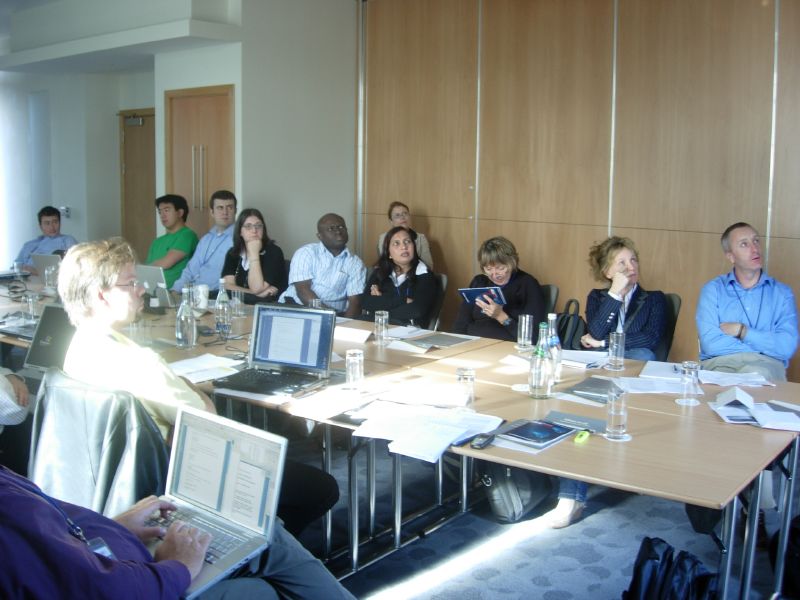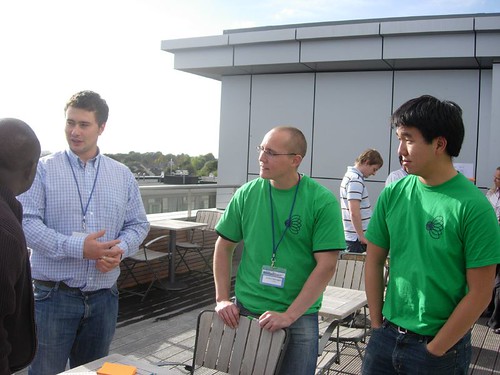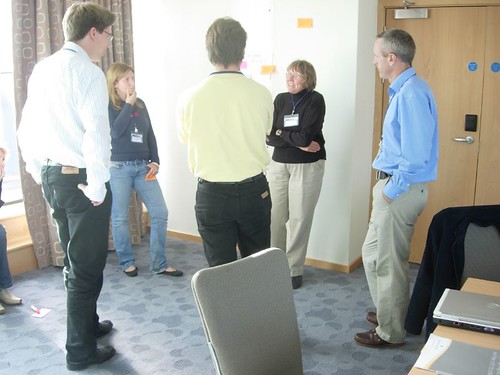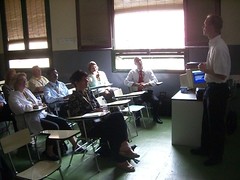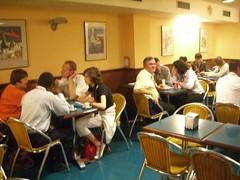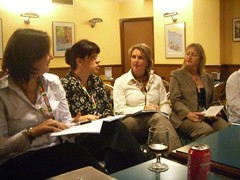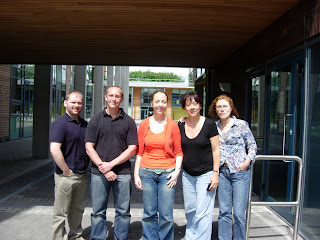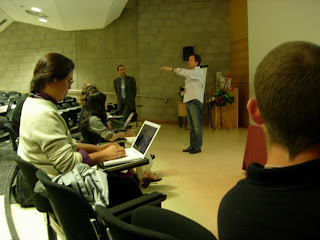Gabriela:
This draft has been sitting here for more than a month... Trying to finish & publish it now!

On June 22 early in the morning I flew to Berlin to attend the
EACE Workshop at
Fraunhofer FOKUS, after a demanding week spent in Dublin doing fieldwork.
The EACE project is part of the ongoing research in Europe looking at ICT technologies for developing new collaborative tools and environments. The EACE project is an 18 month FP6 Specific Support Action set to "investigate further the dynamics, potential and impacts of the technological advances in order to feed the policy making process".
The agenda sounded very interesting, and I was hoping to meet some of the people doing research in the field of Collaborative (e)Working Environments, which ties so well into our work. I'm part of several
AMI@work communities, I'm subscribed to the
ECOSPACE newsletter, but I didn't have yet the chance to meet face-to-face with people doing research in this area, and I thought this would be a good opportunity.
As usually when I travel abroad, I did my homework before(booked the flight, arranged accommodation at friends, printed out directions and a map). Unfortunately, the
Deutsche Bahn website knew nothing about Kaiserin-Augusta Allee, and gave me directions to Kaiserin-Augusta Strasse instead. I had to arrive there before realising there was no Fraunhofer Institut in that area, and it took me a while to get to the right place, so I missed some of the morning talks.
Craig Cmehill from SAP
has blogged the event on the spot (and then waited indefinitely for this post to be published, guessing - I don't know how!- that there was another blogger in the room!).

In the afternoon, Arnd Layer from IBM Germany spoke about
Practical experience with social software at IBM. He spoke about profiles, communities, tagging, internal blogs and activities - all what
Lotus Connections basically offers!, but he illustrated everything with examples, which made the talk really interesting. I really loved this particular tag cloud!
After spending the whole week absorbing information in my fieldwork, I was on the same wavelength with the speaker. When Craig asked: "Is this public? Can I blog this?", I basically couldn't keep from telling him
it was on YouTube:-) as public as it can get!
Arnd also mentioned
Lotus Greenhouse, meant to give customers and collaborators the feeling of the new products, and
ThinkPlace, the internal Web application for facilitating innovation.
Arnd concluded with a few words of wisdom on Business Social Networking:
- listen to your customers;
- use blogs to communicate externally, watch blogs speaking about your own products;
- encourage adoption: instant messaging and web conferences can provide people with real time information;
- use wikis as glossaries for teams / FAQs.
He emphasized that we live in a globalised world, in which the ones who dare and are pro-active will have the advantages. Knowledge Management was - for too long- stuck in top down processes; social networking opens new perspectives.
The next speaker was
Craig Cmehil, Community Evangelist at SAP AG - presenting
The world(s) of the SAP community Network. This time, the facts were completely new, and I had a tremendous surprise to see what a big company can do with these nice tools, if the right attitude and culture are embraced. And of course, the right people - Craig appeared to me as a sort of wizard, open-minded, innovative and ready to try new things in new ways, always present in a hundred places at one time, reading, commenting, adjusting the tools to fit the people.
The SAP community network seems to me an impressive achievement, with separate areas dedicated to developers and business process experts.
What makes the concept interesting are its exclusive content, the downloads available, the worldwide collaboration it fosters and a recognition system for the contributions of its members.
Craig said 76% of the content was actually contributed by the users, which is quite impressive.
He also mentioned specific problems, like French speakers not mingling with the others and having their separate community - but the community network is actually supporting this.
New tools are offered to the community and people are experimenting. Some get adopted, some others don't. He mentioned
Second Life and
Twitter (and t
he case of Sen. Edwards that made the corporate world to actually pay attention to micro-blogging!)
The next presenter was
Volkmar Pipek from
University of Siegen, Germany. His talk was titled
Every Software is Social -Appropriation Support in Collaborative Systems.He tackled one of my favourite topics: the adoption of collaborative software tools, mentioning long-term studies on Groupware adoption such as Orlikowski 1996, Kasten & Jones 1998, Pipek & Wulf 1999.
I loved the idea that good design and user centred software development are important, but they don't guarantee adoption; use dynamics can‘t be fully anticipated.
I particularly liked the statement on the role of social practice around collaborative systems
in adoption. Actually the practice
is the appropriation of these technologies!!
He illustrated his talk with a few examples from their work - the help function of a
tool(an Eclipse-based client for the BSCW system) was combined with a wiki.
The main conclusion was that these ‘appropriation activities’ should be actively supported, and we're moving towards ‘Virtual Communities of Tool Practice’! The designers of a tool can do a lot, but the last mile has to be done by users.
Frank Fuchs Kittowski from
Fraunhofer ISST was next, speaking about
Integration of Knowledge Communities into Knowledge-intensive Business Processes.
I came across Frank's name while I was working for
Fraunhofer IESE and some of my colleagues were involved in a project called
APO-IT together with several other Fraunhofer Institutes, but I never had the chance to meet him in person before.
He spoke about making informal collaboration visible and integrating communities into business processes. Wikis were then brought into the picture for providing "context- (process-) based access to the community" and give birth to "collaborative knowledge activities without process
boundaries (in and across process steps)". I must confess I am a bit skeptical about this idea. It might sound good in theory (finding a cure for a pain we all know it's there!), but it doesn't pay any attention to the fact that communities are living organisms (if we speak about real communities here and not about special interest groups assembled by the management!)
Their approach is actually adding a wiki and a wiki interface to the existing APO Pilot process oriented knowledge base.
The interesting twist is that the application is designed for process integrated learning in the automotive industry.
The last speaker was
George Milis, from
European Dynamics who presented the current results of the EACE project in a talk titled:
Towards a New Policy Framework for the Adoption of Electronic Collaborative Working Environments.The project partners set to elaborate policy recommendations for CWE adoption(Collaborative eWorking Environments) in the EU.
What they came up with was a "layered ontology of collaboration patterns". More on the framework and the 3 selected CWE prototypes in George's slides!
There were mentions about counterbalancing the American supremacy in designing collaborative software tools (doh!). Someone mentioned the
Buerger Portal initiative in Germany - giving every german citizen an email address, a web page, access to shared spaces (who's interested already has all these).
Someone asked the following question: "If the availability of the technologies is not a problem, then how can EU stimulate the adoption?" I tried to bring into discussion the idea the approach shouldn't be centred on the technology and the collaborative tools, but on the purpose for which one would embrace these tools. If a job application procedure or a tax claim can only be done online, people will learn how to use it. But putting the carriage in front of the horses won't help!
I mentioned
Karin Knorr-Cetina's work on Sociality with Objects that has been used by
Jyri Engestrom to show
why some social network services work and others don't.Another discussion topic was the (disappearing) work-life balance. People tend to take care of personal matters durring the working hours and work from home in the evenings, so the boundaries between work and free time tend to get blurred. Arnd stated that what's happening inside IBM shows that actually adding a social dimension to work improves productivity.
Volkmar argued that life needs structure -say the psychologists!
The question: Do we need a collaboration etiquette(c-etiquette)? was also asked. Could such an etiquette be modelled ? (In my opinion, it can only emerge!)
The opportunity of using CWE as a vehicle for transferring knowledge and skills to new and younger employees was also touched in the discussion.
The slides of the presentations were made available for download, and there are also
a few pictures from the event available.
Together with Craig Cmehil, we managed to ignite some interest for social software tools and especially for
Twitter and
Dopplr! Unfortunately, the enthusiasm was short lived - none of the invitations I've sent were ever answered!
Craig also uses a nice tool I wasn't aware of -
Time-to-Meet - for scheduling his meetings.
There's a link to a database full of
other fancy applications on his blog.
In conclusion, it was an interesting event and a good networking opportunity, but my original expectation of getting associated with some FP7 proposal writers in this area wasn't unfortunately met.
 Anne, Daniel and Gabriela attended today a Lero talk by Dr. Margaret-Anne Storey - associate professor of computer science at the University of Victoria, Canada.
Anne, Daniel and Gabriela attended today a Lero talk by Dr. Margaret-Anne Storey - associate professor of computer science at the University of Victoria, Canada.




